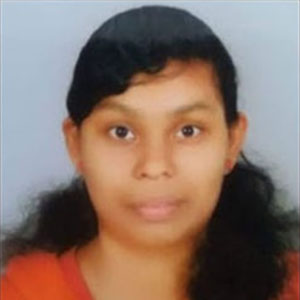





Division of Digital Sciences
About the Division
The Division of Digital Sciences, in the School of Sciences, Arts, Media and Management serves with the primary objective of educating and moulding students – as dynamic, competent, valued and knowledgeable professionals who shall lead the nation to reach the zenith of leadership in the field of Digital Sciences. Experienced faculty along with a well-planned infrastructure facilitates the students to achieve excellence in their career. The Division offers multiple UG & PG and Doctoral programs in diverse disciplines: B.Sc. & M.Sc. Information Security and Digital Forensics; M.Sc. Artificial Intelligence and Data Science; Ph.D. Programs in Computer Applications, and Mathematics.
Our Vision
To provide holistic development in the areas of knowledge, skill and attitude by extending professional teaching, personal care, spiritual nourishment and stimulating a thirst for research so as to raise academically excellent, ethically strong and spiritually matured graduates and post graduates to serve society.
Our Mission
- To raise graduates with areas of knowledge on Computer Application development, Digital Sciences and Information Security.
- To equip graduates to exhibit social concern and to solve problems through Technology.
- To simulate a thirst for research on recent trends in the field of Computer Applications and Digital Sciences.
B.Sc. Information Security and Digital Forensics
- PEO I: Exhibit the technical knowledge and skills to protect and defend computer systems and networks.
- PEO II: Track the digital activities of potential criminals and help investigators find digitally stored information about their activity.
- PEO III: Educate the needy to understand the impact of cybercrimes and threats with solutions in global context.
Graduates will be able to:
- PO 1: Knowledge and understanding: Broad knowledge and understanding of the theories, principles and techniques of basic sciences and computing the solution of complex scientific problems.
- PO 2: Problem analysis: Demonstrate sound understanding of all the main areas of data science, information security, artificial intelligence, computational analysis and to apply this to the evaluation of computing applications.
- PO 3: Design/development of solutions: Design algorithms and implement solutions among the subsystems of computing.
- PO 4: Exploration of problem: Ability to identify and solve problem, draw upon supporting evidence and demonstrate a deep understanding the need for high quality solution.
- PO 5: Modern tools usage: Create, select and apply appropriate techniques, resources, and modern data science, information security, statistical, and machine learning tools towards problem solving and solution analysis for domain specific problems.
- PO 6: Data & Information scientist and society: Sufficient skills in data analysis and to assess societal, health, safety and legal issues and to secure the information.
- PO 7: Societal and environmental concern: Utilize the data science, security, machine learning and statistical theories for societal and environmental concern.
- PO 8: Professional ethics: Apply ethical principles and commit to professional ethics and cyber regulations, responsibilities, and norms of professional computing practices.
- PO 9: Individual and team work: Function effectively as an individual, and as a leader in diverse teams, and in multidisciplinary environment in achieving a common goal.
- PO 10: Communication: Communicate efficiently on complex activities with the scientific community on activities relevant to society at large and comprehend reports and documentation.
- PO 11: Application in multi-disciplinary domains: Understand the role of statistical and computational approaches and apply the same to solve real time problems.
- PO 12: Project management: Demonstrate knowledge to analyze and solve advanced problem in data science, information security, artificial intelligence and computational analysis for career advancement.
B.Sc. Data Science and Analytics
- PEO I: Impart the knowledge of programming skills and adapt latest technologies to solve the real-life problems of humanity.
- PEO II: Provide innovative solutions to complex problems through relevant research on Artificial Intelligence and Machine Learning.
- PEO III: Demonstrate competencies and practical skills required for effective problem solving and decision making in data science.
Graduates will be able to:
- PO1: Knowledge and understanding: Apply the knowledge by understanding the theories, principles and techniques of basic sciences and computing the solution of complex scientific problems.
- PO2: Problem analysis: Analyze problems in the areas of data science, information security, artificial intelligence, computational analysis and to provide solutions by the evaluation of computing applications.
- PO3: Design/development of solutions: Design algorithms and implement solutions among the subsystems of computing.
- PO4: Exploration of problem:Identify and solve problems by supporting evidence and demonstrate a deep understanding of the need for high quality solutions.
- PO5: Modern tools usage: Create, select and apply appropriate techniques, resources, and modern data science, information security, statistical, and machine learning tools towards problem solving and solution analysis for domain specific problems.
- PO6: Data & Information scientist and society: Develop sufficient skills in data analysis to assess societal, health, safety and legal issues and to secure the information.
- PO7: Societal and environmental concern: Utilize the data science, security, machine learning and statistical theories for societal and environmental concern.
- PO8: Professional ethics: Apply ethical principles and commit to professional ethics and cyber regulations, responsibilities, and norms of professional computing practices.
- PO9: Individual and team work: Function effectively as an individual, and as a leader in diverse teams, and in a multidisciplinary environment in achieving a common goal.
- PO10: Communication: Communicate efficiently on complex activities with the scientific community on activities relevant to society at large and comprehend reports and documentation.
- PO11: Application in multi-disciplinary domains: Demonstrate the knowledge of statistical and computational approaches and apply the same to solve real time problems.
- PO12: Project management: Device mechanisms, analyze and solve advanced problems in data science, information security, artificial intelligence and computational analysis for career enhancement.
M.Sc. Information Security and Digital Forensics
- PEO I: Contribute in research and provide innovative solutions in the field of cyber security.
- PEO II: Understand the impact of cybercrimes and threats with solutions in a global and societal context.
- PEO III: Identify, analyze and mitigate the complexities associated with threats on data transmission and recovery.
Graduates will be able to:
- PO1: Acquire problem solving, initiative and enterprise skills that contribute to productive and innovative outcomes.
- PO2: Develop and update domain knowledge relevant to the chosen field to succeed in highly competitive and rapidly changing work environments.
- PO3: Prepare to utilize the acquired knowledge leading to innovation and entrepreneurship in order to eliminate the problems of the society.
- PO4: Demonstrate the ability to design and conduct experiments, demos, create models to analyze and interpret data.
- PO5: Design and perform experiments related to scientific and computational theories and conceive potential technological applications.
- PO6: Demonstrate ability for collaborative research and scientific communication through projects, internship and on-site training.
- PO7: Conceive the ways and means to address various social, economic, environmental, human rights and other critical issues faced by humanity at the local, national and global levels.
Testimonies by our Alumni
I am working as an Analyst in Deloitte and profoundly would like to share that “Root” is an important word and I must say “Karunya Institute of Technology and Sciences” is one place where it all started for me. Post-Graduation was just a certificate but the journey that made me capable of going that one extra mile can’t be summarized in a few words. Apart from lecture rooms, labs or any practical experience we could ask for, our mentors enabled us with industry level capabilities and that made the difference. I extend my heartfelt thanks to my mentors for their selfless efforts. Karunya University has provided me with the roots to follow my dreams and passion and I am exploring my potential in every sphere of life. I owe gratitude to all my mentors and Karunya for enabling each one of us to believe in ourselves and preparing us to embrace the ever evolving challenges.
For as long as I can remember, I always had the urge to do something radically different with my life. Back in 2018, as an outsider, I traveled to Coimbatore to be a Karunyan, forever. In just 6 months, I remember acting as the class rep and working for various Student Chapters, being Creative at department events, organizing workshops and wholeheartedly enjoying the learning process. As time passed by, I realized that Karunya Institute of Technology and Science gave me, the wings to fly and achieve my dreams. Karunya University provided the platform to study, excel, compete and explore my potential. Motivational teaching, making projects, learning at The internship helped a lot in understanding both the technical aspects and clearing the job interviews. The Training and Placement department helped me in acing through the campus placements. I went on with my journey when I got placed in ValueMentor as a junior consultant and before graduating. Today, I am fortunate enough to be working in Deloitte DTTIL, Kochi. Balancing the world of lifestyle, fashion, travel, beauty & fitness along with a full-time job gave me a strong sense of elevating my passion to the next level. I am thankful to Karunya Institute of Technology and Sciences, the management, My mentors, friends, and all my well-wishers, for all the support and proud to be a part of the Karunya Alumni Network.
Karunya has been a niche for me. The immaculate weather, the greenery and the environment as a whole has been the best and conducive. The institution provided me with endless opportunities to learn and groom myself as what I am today. The staff are experienced, efficient and friendly. Karunya is not an academic heavy institution, it is rather a place for overall development like discipline, leadership, presentation skills, sports and other academic and non-academic skills. I cherish the memories of Karunya, as I have always felt it as a home away from home. #
I am Balaji Prasath S graduated in Information Security and Digital Forensics in in the year 2021. Currently I am working as a Security Analyst in Crossbow Labs LLP, Bangalore. I am really amazing to see the changes that has brought in Karunya. I am proud to say that I am a Karunyan and Karunya helped me to develop my skills and attitude. Karunya gave me the spiritual foundation that has helped me overcome all life's challenges. It’s always a great feeling to come back to Karunya. Karunya is the place where all my dreams came true. I could do everything that I had planned for. It taught me what life is all about. My faculty members, hostel life and my friends played a significant role in shaping my career. I have learnt many life lessons living and spending quality time with people from different states speaking different languages and with different culture. Altogether, Karunya provided me a wonderful experience.
I am agna from 2018 B.Sc. Information Security and Digital Forensics batch. Karunya gave me endless platforms to rise and shine. I had such a surreal experience when I started studying there and the course ' Information security and digital forensics' which is very applicable to the modern scenario which provides unlimited opportunities. Currently I am working as Scholar Trainee in Wipro Technologies.
Karunya Institute of Technology and Sciences has enriched its students with realistic experiences in the fields of Technology, Sciences and Arts. Pursuing M.A in English from Karunya University (2018-2020 batch), has been a dream come true for me. Being at Karunya for two years, I personally felt it as a home away from home. As our anthem states “One in a million we are His choice”, this University indeed assists the ‘Chosen’ Karunyans to flourish and to bring out the best in them. Karunya has provided me with multi-ethnic experiences as it is embellished of students of both multi-culturalistic and multi-linguistic backgrounds. Our English department consists of professors who encourage student-centered method of teaching. They’ve also renewed students’ confidence to learn not only literature and language, but also aided them to be placed in renowned companies and schools. Through their best support I was able to acquire interpersonal, communication, problem-solving and many more personal development skills.
Studying in Karunya was one of my dreams right from my childhood. And my dream came true the moment I stepped into that beautiful campus in the year 2019. In Karunya, I have had the opportunity of experiencing the happiest days of my life. Yet I would like to say that, it’s a place where knowledge is pursued for its own sake and where students work patiently in search of wisdom and learning. It not only imparts the students a sense of mission in life, but also furnishes them with a set of values which should serve as guideposts in the journey of life. The different opportunities that came my way in Karunya like leading morning assemblies, SBM, etc., is a blessing in disguise. Thanking God Almighty for all the opportunities.
As one enters Karunya University, it becomes “another world” for them. We shift from having a “student” label to a “Karunyan” as we walk through the gates of the University. Choosing to study at this University had been one of the best choices I made in my life. When I joined in 2019, the thought of leaving the University after completing my studies was my only despair. Anyone who enters the University would feel so blessed with the overall infrastructure, the facilities and the environment. Nowhere in the world would you find a University so beautifully carved into the mountains. In our anthem, there’s a saying that we are one in a million of His choice. It’s also right to say that Karunya is one in a million. The faculty encouraged me to score 1st rank in the English department and also helped me to become a better version of myself.
News and Events
Admissions open for, B.Sc. Information Security and Digital Forensics, M.Sc. Information Security and Digital Forensics and M.Sc. Artificial Intelligence and Data Science.
Contact Us
The Head of the Department,
Digital Sciences,
Karunya Institute of Technology and Sciences,
Coimbatore, India- 641114.
Email: [email protected]
Phone: 0422-2614460








